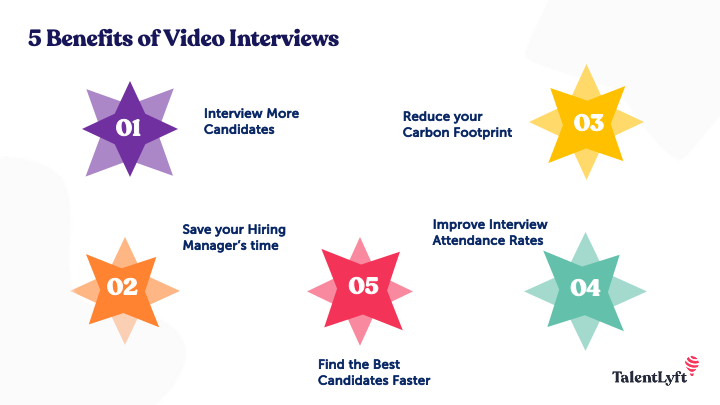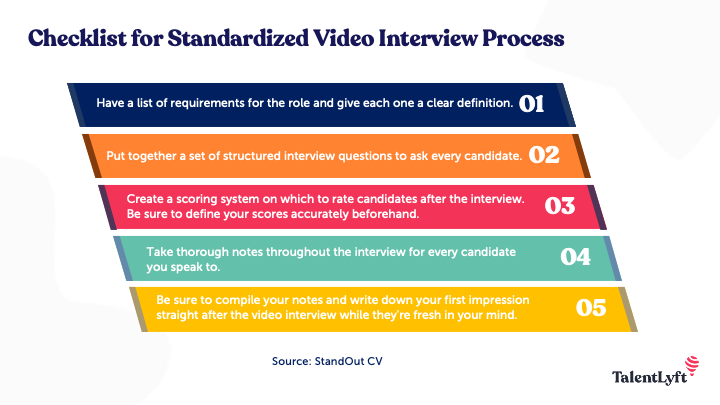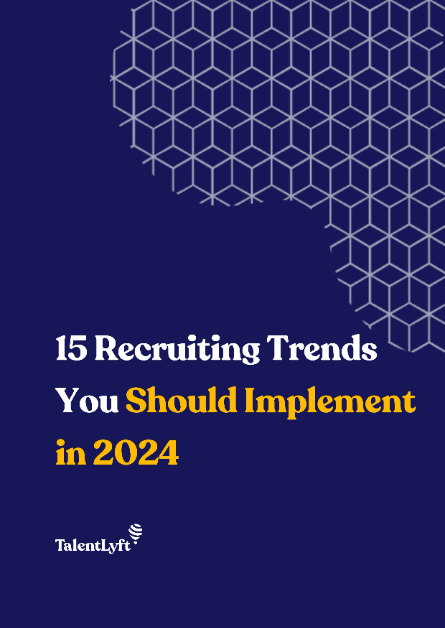![https://adoptostaging.blob.core.windows.net/article/R_bqFel30kOhkhP_zbsK8w.png]()

This article uncovers five of the top benefits of adding a video interview stage to your recruitment process – before exploring a series of insider tips on how to get the best from them.
1. Interview More Candidates
Arranging and carrying out video interviews takes a lot less time than conducting a face-to-face interview. By eradicating the arrival and sign-in process, cutting out the potential of late arrivals, and ceasing the need to factor in the schedule of both the interviewer and the candidate in finding a suitable time to meet in person, video interviews allow you to meet more candidates in the same space of time. They will enable you to meet more good candidates or even allow for quick screening of those candidates on the fence regarding requirements and uncover hidden gems.
2. Save Hiring Managers' Time
From scheduling headaches and hiccups to late arrivals and resume exaggerations - meeting for face-to-face interviews can often mean giving lots of time to candidates who turn out to be unsuitable. Video interviews can be completed much sooner given the lack of travel required, enabling hiring managers to fit interviews into a small gap in their schedule rather than carve out full mornings and afternoons for a series of in-person meetings. So, when you video interview the inevitable unmatched candidates, they take up a lot less of the hiring manager's time and allow them to interview more candidates and get on with their day.
It is also worth noting that recruiters can interview more candidates by video in any given time frame. That means that internal or external recruiters will be able to screen more applications via video, increasing the quality of candidates who reach the hiring manager, reducing the risk of them interviewing unsuitable candidates. Saving hiring manager's time ultimately affects their efficiency and leaves more space for the strategic aspect of their job.
3. Reduce Your Carbon Footprint
Sustainability is becoming vital to business processes, so employers need to reduce their negative impact in every way possible – including recruitment. Video interviews altogether remove the need for candidates to travel to you, meaning either party carries out no flights or car journeys.
With the Covid-19 pandemic proving to businesses worldwide that conferences, meetings, and recruiting can operate perfectly smoothly via remote communication, this is a tremendous accidental benefit of remote hiring.
4. Improve Interview Attendance Rates
Unless serious emergency crops up or somebody is taken ill, both parties are far less likely to cancel or miss the interview if they can dial in from anywhere in the world. At the same time, face-to-face interviews are easily derailed by a bad cold, train cancellations, or even a change of heart from a candidate who decides against making the 1 hour trip to your office. The reduced travel and commitment required from candidates and hiring managers means that a higher percentage of interviews are likely to be conducted as planned, once again leaving you with a bigger pool of candidates at the end of the interview round.
5. Find the Best Candidates Faster
With hiring managers keen to get the right candidate in place for their vacancies as quickly as possible, this is by far the most crucial benefit of video interviews for businesses. The culmination of interviewing more candidates, reducing the hiring manager's involvement, and increasing interview attendance rates will lead to a better candidate pool building in a shorter space of time. That will ultimately lead to hiring better candidates faster than competitors can reach them. It will also mean reduced costs for the business by decreasing the amount of time and resources spent recruiting for each role. And as an added benefit, it's also better for the planet and saves candidates' time and money.
Tips for Adding Video Interviews to Your Recruitment Process
With the benefits that video interviews provide in speeding up and streamlining the recruitment process, it's easy to see why many employers will be sticking with it. Achieving cost savings and improved results to your recruitment process is not easy, but following these best practice tips will steer you in the right direction.
Get the Right Tech in Place
How many times have you stepped onto a Zoom or Teams conference call due to connection issues with at least one participant in the meeting? Whether it's a muffled voice or a poor connection, there is nothing more off-putting or distracting than technical issues mid-interview or during a meeting. And when it comes to the interview in particular, this is certainly not going to create a good impression for either party.
As the hiring manager or recruiter, it is your job to ensure that you have the right technology in place for video interviews and that it is all working before the candidate logs into the call. You should ensure that your team has a reliable and user-friendly video-call application and that everybody are trained for using it. You also need to provide good video cameras and microphones so that interviewers can be seen and heard clearly. A sturdy internet connection is essential, so ensure that all interview devices are wired into the network and not rely on Wi-Fi, which is prone to dropping out.
One of the best and most simple ideas that many businesses are implementing is sending the link out around a week in advance, giving the candidate plenty of time to download and work out the software they need for the call (and how to use it). In much the same way, as you might provide directions and guidance as to what will be expected of the candidate in advance of a face-to-face interview.
Check out our list of Top 7 FREE Video Interview Softwares!
Add Video Interviews at Early Stage
Video interviews are most effective when carried out early in the process – almost like an advanced screening version. They essentially allow for more detailed screening of candidates without the need for travel or expenditure. By conducting video interviews as the first interview stage, you will hold on to more active candidates and engage them quickly – allowing them less time to be snapped up by competitors or leave the market for other reasons.
Suppose you are planning on leaning solely on the video interview process. In that case, you will likely find that you need more than one stage – an initial video interview screening with the top 5-8 candidates and potentially a second interview for your final two candidates.
Suppose you decide to add a face-to-face interview into the process. In that case, the video interview will be most effective between the CV screening and the physical interview – used to cut the candidate list down and ensure that the hiring manager only meets those most suitable for the role who have passed the early stages.
Use a Standard Reviewing Process
As with face-to-face interviews, you need to make sure that you have a standard review process in place for video interviews.
That helps ensure you make fair comparisons of all the candidates you speak with and comply with any equality employment laws.
To ensure a fair and standardized video interview process, you should:

Review and Improve the Process
Be open to the idea of improving your video interview process based on success, issues or challenges presented, and suggestions from staff and candidates. Give your candidates the best chance of success with a streamlined and efficient process designed to support them rather than present them with unnecessary challenges.
That might mean judging the effectiveness of the video conference software you're using, checking on your standardized process, and asking staff how you could improve the process for them. By focusing on effectiveness, you will identify any issues and continually improve your video hiring strategy.
Video interviews have grown in popularity exponentially thanks to the pandemic and social distancing, and it seems they set to stay for those businesses focussed on bringing in the best recruits without delay. While there is still a place for face-to-face interviews in the recruitment process, with video technology now so advanced and easy to manage, it seems clear that video interviews provide a time-saving and efficient step in an often lengthy and complex process.
Author's Bio
Andrew Fennell is the founder and director of Job Description Library and StandOut CV; two leading UK careers advice websites. He is a former recruitment consultant and contributes career advice to publications like Business Insider, The Guardian, and The Independent.
![Boolean Search for Recruiters [Actionable Guide]](https://adoptoprod.blob.core.windows.net/article/7wyu_xAg806Tm_lmFg71Rw.png)

















